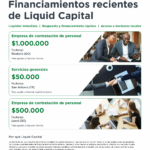If you’re building your business growth plan, include invoice factoring
Invoice factoring shouldn’t be considered a last resort. It’s a powerful alternative funding solution that can jumpstart your business growth planning, and should be included as a fundamental funding resource for many companies. Here’s why.

Often business owners think that invoice factoring is only for failing businesses. But this is a common misconception. Businesses that are on a high growth trajectory can benefit greatly from alternative funding such as invoice factoring.
Unlike a traditional bank loan or line of credit, your funding amounts are based on the size of your accounts receivables. While banks qualify you based on your business credit strength, your invoice factoring partner will look at variables such as your accounts receivables and your customer credit strength.
This means you may often qualify for funding amounts larger than what a bank can offer, which can really help when you’re looking at ways to fund your business growth plans. You can also access extra working capital quickly, allowing you to seize growth opportunities when they arise without worrying about how you’ll support the associated operational costs.
Does your current funding solution and partner support your business growth plan?
It’s a common situation that many of our clients find themselves in: they have a great growth opportunity, but their current funding arrangements aren’t enough.
For instance, when Carm Borg, President and CEO of Global Aviation wanted to expand his business growth plans, the bank couldn’t sufficiently support the financing he needed.
“The banks want three to five solid years of history, whereas factoring will base their funding solutions off of your current book of business.”
— Carm Borg, President and CEO of Global Aviation
With Liquid Capital, Borg was able to access over $40 million in working capital over the years he spent working with his local Liquid Capital Principal. “They gave me the ability to grow the business twice as fast,” says Borg.
Other traditional sources of funding, such as venture capital deals, often require that you sacrifice some of that equity, factoring does not. You’re able to keep ownership of your company, access the funds you need and manage your business growth plans on your terms.
Is invoice factoring really too expensive?
One common concern about many financing solutions is the cost to the business — both monetary and other. If you take into account the planning, time spent and other expenses that go into just attempting to get loans, lines of credit, grants, venture capital, angel investments, family donations and other investment dollars, those costs really add up. You may not even be successful in gaining capital, and then you’re further behind.
When compared to the fees, interest and equity lost from these other kinds of financing, invoice factoring can be much more favourable. Your invoice factoring partner can work out the numbers quickly to explain how much you’ll receive upfront, which allows you to plan your next move with reliability.
As part of the factoring process, you can also cut your admin costs.
When a business factors invoices, it no longer has to worry about collecting accounts receivable. This responsibility (and risk) shifts to the factoring partner, which effectively becomes the business’ outsourced credit and collections department. The factor takes over all aspects of credit and collections including folding, stuffing, mailing and documenting invoices and payments. This frees employees up from these time-consuming tasks so they can focus on core business pursuits.
At Liquid Capital, we also don’t make you jump through hoops just to learn if you’ll qualify for funding. We try to qualify our clients quickly and provide practical guidance if there are areas you need to improve.






